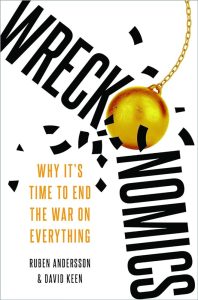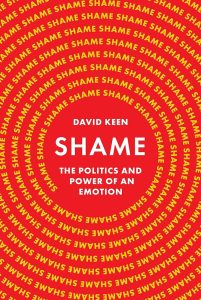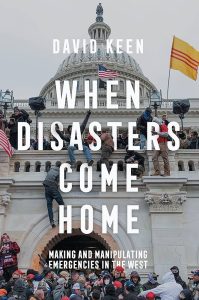Professor David Keen tells us about the three books he published last year. Wreckonomics, Shame and When Disasters Come Home collectively critique how language, emotions, and crises are utilised by those in power to maintain and expand their control. All three books offer in-depth insights into the dynamics of contemporary politics and society.
Professor Keen will be talking about Wreckonomics and Shame at the Oxford literary festival on Tuesday 19 March 2024.
Wreckonomics: Why it’s Time to End the War on Everything (Oxford University Press, 2023), co-authored with Professor Ruben Andersson of Oxford University
Drawing on our experiences of wars and migration emergencies, social anthropologist Ruben Andersson and I saw an intriguing pattern. We looked at the wars and fights on terror, drugs, illegal migration and Covid, and we found that ‘war’ framings have been serially unhelpful. Meanwhile, flawed and failing policies have been repeatedly gamed by those who stand to benefit; in many cases, beneficiaries have stoked the problem so they can extract the maximum price for promising to address it.
The result is that a wide range of problems — and enemies — are being predictably reproduced, while failure — helped by a rather systematic manipulation of information — has become a peculiar kind of success. We stress the need to recognise the skewed distribution of costs and benefits within these ‘failing-but-succeeding’ systems. We conclude that by challenging the damaging rhetoric of war, we can open up the political space in which dissent and progress become more realistic possibilities.
Shame: The Politics and Power of an Emotion (Princeton University Press, 2023)
Most of the world — and perhaps half of America — continues to be astonished that a serial liar, a man who faces multiple legal actions, and a man who openly pushed to overturn the 2020 Presidential election results can be a serious candidate for another term of office. Trump’s toxic combination of popularity and shamelessness finds many echoes elsewhere — Johnson to Meloni and even Putin. In these circumstances, some observers have spoken of ‘the death of shame’.
But is shame really passé? Have we really moved on? The book argues that in order to understand — and resist — our current crop of shameless leaders, we should not assume that shame has somehow been banished. Rather, we need a much better understanding of profound role that shame and its manipulation is playing in modern advanced democracies. While ‘shame and honour cultures’ have often been seen as confined to the past or to distant lands, manipulating shame is actually proving central to the current ascendancy of right-populism. A key move — and a tactic that has long been profitable in the field of consumerism — has been to offer an escape from shame while simultaneously stirring up that shame. In this mode, shame does for politicians what fear does for the mafia.
In the face of conspicuously shameless leaders like Trump and Johnson, a common response has been to intensify the shaming — not least through the online shaming industry. Yet this reflex has itself been repeatedly instrumentalised by these skilled manipulators of shame, as when they have insisted that shaming them means shaming their supporters. What is emerging is a kind of politics of non-apology that draws strength precisely from opponents’ attempts to mobilise shame, whether this is shame for the sins of the present or the colonial/racist/fascist sins of the past. This is part of what makes these shameless leaders so scary.
The book also looks much more broadly at the manipulations — and perverse distributions — of shame that accompany violence and inequality. It examines civil war in Sierra Leone, shame in civil and international wars more generally, violent crime, Brexit, the legacies of empire, consumerism, and the peculiar honour-and-shame of US veterans.
When Disasters Come Home: Making and Manipulating Emergencies in the West (Polity, 2023)
Populist turmoil, pandemic chaos, embattled borders… It seems that Western democracies are increasingly falling foul a problem that has long beset the global South — the opportunism of politicians and other elite actors when confronting disasters. Much of classical thinking about politics and economics suggests self-correcting systems that benefit from in-built ‘checks and balances’, and democracies have been widely held to be better insulated from disasters than autocracies. But today, the book argues, we have a disaster-producing system that seems to be self-reinforcing, a politics that thrives on the very crises it is helping to produce.
As Western politicians turn to a politics of distraction and a theatre of cruelty in which magical solutions are persistently peddled, a number of overlapping disasters — including a crisis of democracy, global warming, and forced migration — are being used to bolster the toxic politics that helped to generate them.
The views expressed in this post are those of the author and do not reflect those of the International Development LSE blog or the London School of Economics and Political Science.








